|
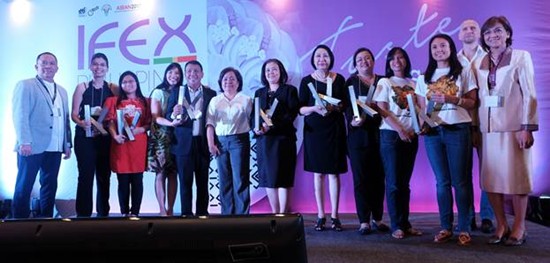
DTI-CITEM
Executive Director Clayton Tugonon (leftmost) and DTI
Undersecretary Nora K. Terrado (rightmost) introduces the
winners of the 2017 Katha Awards for Food at IFEX Philippines. |
Katha Awards for
Food spotlights innovative, export competitive products at IFEX
Philippines
By
DTI-CITEM
May 20, 2017
PASAY CITY – The 11th
edition of the International Food Exhibition (IFEX) Philippines,
through the 2017 Katha Awards for Food, once again pays homage to
newly developed Philippine food products and applications yesterday at
the World Trade Center Metro Manila (WTCMM) and Philippine Trade
Training Center (PTTC).
The awards aim to strengthen the reputation of the Philippines as a
go-to destination for globally competitive Asian food and ingredients
by recognizing companies that explore new galleries of flavors,
original brand ideas, unique food fusions, and creative packaging
methods.
The competition is open to all Philippine-based food manufacturers and
suppliers participating in IFEX Philippines 2017. The winners are
hailed from six different product categories: Food Ingredients, Marine
and Meat Products, Snack Foods, Beverages, Processed Fruits and
Vegetables, and Confectionery and Biscuits and Pastry. The company
with the most creative booth exhibition is also recognized.
Katha Awards for Food was judged by SM Supermarket Senior Vice
President for Marketing Millie Dizon, ZOMATO Philippines Country
Manager Anton Ojeda, Philippines Airlines Manager for Food Planning
and Standards Division Maria Criselda Abantao Rayos, and Food
Packaging and Labeling Expert Abner Villahermosa. They chose the
winners according to Market Demand, 25%; Packaging Design and
Innovation, 35% and; Product Innovation, 40%.
Here are the category winners of the 2017 Katha Awards for Food:
|
 |
|
Food Ingredients: FIERY LABUYO BARBEQUE MARINADE of Mama Sita’s
Instilling innovation while keeping its century-old culinary
tradition, Mama Sita’s has newly concocted to perfection the Fiery
Labuyo Barbeque Marinade for lovers of spicy food fusions.
Bold and fiery, the native labuyo chili pepper offers a truly
unforgettable barbeque experience without the monosodium glutamate
(MSG) and other preservatives. |
|
 |
|
Marine and Meat Products: FISH SAUSAGES of Fisherfarms, Inc.
Fisher
Farms All Natural Fish Sausages are free from artificial ingredients
and chemical preservatives. Made from 100% fish meat, they provide
around 10% of the recommended daily allowance of protein, contain
Omega-3, and have 0 trans fats.
Free from gluten, casein, nitrites, and MSG, Fisher Farms All Natural
Fish Sausages are perfect for health-conscious gourmets and sausage
aficionados. |
|
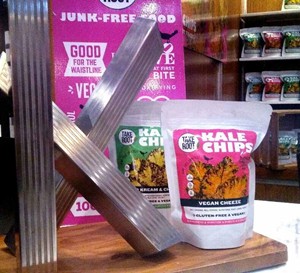 |
|
Snack Foods: KALE CHIPS of Take Root Food Corner
Imagine a
completely guilt-free, vegan chip that combines the taste of tangy
sour cream with freshly cut chives!
Take Root Food Corner’s Kale Chips is made with all-natural and
organic ingredients. No oil, dairy, sugar or any preservatives. Made
from nutritionally dense leafy greens available, these addicting kale
chips are never baked or friend, but dried at low temperatures to
preserve its essential nutrients and enzymes. |
|
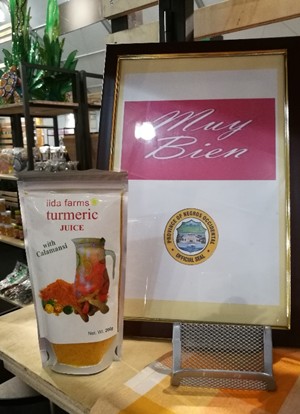 |
|
Beverages: TURMERIC TEA WITH CALAMANSI of Muy Bien
Turmeric Ginger
Lemongrass is a sweetened tea drink made by the Negros
Occidental-based Muy Bien Ventures Co. Inc. from the natural and
organic extracts of turmeric, ginger, lemon grass and calamansi.
Turmeric comes from the root of Cucuma longa plant. Called in the
Philippines as "Luyang Dilaw," turmeric has a tough brown skin and
deep orange flesh. Curcumin, the main active ingredient in turmeric,
has a powerful anti-inflammatory effect and a very strong antioxidant. |
|
 |
|
Processed Fruits and Vegetable: PUSO NG SAGING of KAPFER AND RIVERA
UNITED INC.
Also known as “Ginataang Puso ng Saging,” this
ready-to-eat Philippine dish satisfies the cravings for a hearty and
savory meal – perfectly served on a hot cup of rice or as an appetizer
paired with toasted bread and melted cheese on top.
Puso ng Saging is high in fiber and rich in taste, while completely
being pork and chicken free. |
|
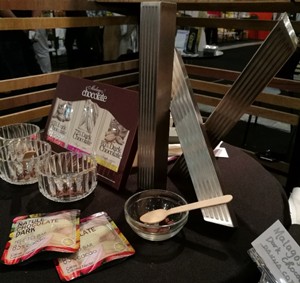 |
|
Confectionery, Biscuits and Pastry: 85% NATULE CHOCOLATE DARK of
MALAGOS AGRI-VENTURES CORP.
Developed to cater the taste of the
high-standard Japanese market, the 85% Natule Chocolate Dark is an
all-organic treat lets you experience the true essence of cacao,
enriched with the subtle sweet aroma of coconut nectar.
The product was made under Malagos Chocolate’s single-origin chocolate
production or what they call the “tree to bar” process, which involves
the planting, harvesting, fermenting, solar drying, roasting, and
processing of the cacao beans into fine-flavored chocolates. |
|
 |
|
Best Booth: Fisherfarms, Inc.
As a pioneer in aquaculture products
processing, Fisherfarms, Inc. stages this year’s IFEX Philippines with
a bright and modern scenography, highlighting the interesting insights
on the Philippines’ seafood products, as well conducting on-site
cooking and food sampling activities.
Fisher Farms, Inc, has one of the country’s widest range of premium
quality fresh, frozen, value-added, and completely processed seafood
products to clientele and institutions such as supermarkets,
groceries, fast food chains, restaurants, distributors, and hotels all
over the world. The Philippine seafood innovator is currently present
in key markets such as USA, Canada, Middle East, Asia, Africa,
Australia, and Europe. |
2017 labor day state of
workers
Government,
employers ignore workers’ slide to poverty, inequality
By
Associated Labor Unions (ALU)
May 1, 2017
DAVAO CITY – The
country’s biggest labor organization, the Associated Labor Unions (ALU)
warned of uprising among the working poor as means to be freed from
misery if government and employers continue to ignore worsening
poverty and inter-generational inequality caused by joblessness,
inadequate wages, insufficient social protection benefits and
precarious short-term work arrangement.
“We have been witness to
recent series of events where our poorest poor people were forced to
raid rice warehouses, invade government housing units and claim
ownership to lands that they felt was deprived from them. We do not
condone nor tolerate these illegal actions but we attribute these
series of lawlessness as symptoms of an irresponsive government and
inhumane employers and capitalists,” said Alan Tanjusay.
Diminishing value of wage vs. rising inflation
Despite of the country’s
consistent economic growth, the purchasing power of daily minimum wage
fell significantly in the face of 3.4% inflation rate registered in
March 2017.
In a monitoring made by ALU,
the purchasing power, for example, of P491 daily minimum wage in the
National Capital Region fell to P361 in February 2017. While the
average purchasing power of daily minimum wages in regions outside NCR
is P250 a day.
These rates are considered
way below the 2015 standard poverty level of P393 required amount
needed by a family of five for food and non-food needs to survive in a
day.
“This condition needs
immediate response from government and employers. Workers are now
desperate and if this is met inaction many will resort desperate means
to survive,” Tanjusay said.
Tanjusay cited incidents in
April last year where 300 farmers attempted to ransack a rice
warehouse, the recent invasion of government housing units in Bulacan
by hundreds informal settler families and last week’s invasion of a
portion of Hacienda Luisita in Tarlac by landless farmers.
Poverty
To back up his claims on
growing poverty, Tanjusay cited the result of survey a few days ago by
the Social Weather Station (SWS) estimating there are 11.5 million
families or 69 million individuals who said they are impoverished
compared to 10 million families or 60 million individuals in December
2016.
With a vast amount of wealth
generated by a consistently growing economy, why does millions of
families still feel deprived? Where does the money go?
Aside from 40 families of
oligarchs still controlling the economy, Tanjusay specifically
identified the drivers of poverty among workers and their families.
These are growing unemployment, underemployment, and meager social
amelioration benefits.
He said the drivers of
poverty among working poor are the growing unemployment, widening
underemployment driven by inadequate wages, precarious
contractualization short-term contractual work arrangement,
jobs-skills mismatch, inadequate social insurance, worsening traffic
congestion and fire-prone workplaces.
Workforce
Government’s Labor Force
Survey released on March 14 this year, 39.4 million Filipinos are
employed, out of which are 2.8 million without jobs while 6.4 million
are underemployed of the total 69.4 million workforce as of January
2017.
“With only a few families
controlling the economy, our government institution should function
according to their mandates and enforce our laws and implement
programs to make the money trickle down to benefit workers who helped
built that wealth. But these are dysfunctional.
“Analyzing these numbers,
the cause of concern out of this survey is not just on those jobless
but we are monitoring the behavior of the underemployed as well or
those who have jobs yet their income is inadequate to meet their
needs,” Tanjusay said.
Causes of unemployment and underemployment
He identified the causes of
unemployment and underemployment as contractualization, jobs-skills
mismatch, low minimum wage, rising prices of goods and cost of
services, diminishing purchasing power of meager minimum wage and lack
of jobs-creating investments due to expensive electricity, water and
transportation cost, expensive but poor telecommunication and internet
services.
Workers productivity at work
and quality time at home are also hounded by tardiness, fatigue,
stress, caused by worsening traffic congestion and poor mass transport
system and inadequate and aging infrastructures such as airports,
seaports, container ports, railways, roads and bridges.
The ALU also attributes
unemployment and underemployment to high cost of doing business
imposed by local government units, judicial proceedings, and
government red tape, illegal smuggling, occupational safety and
health, tedious labor cases, and meager social protection coverage
including low pension benefit, rising crime incidents, and continuing
peace and order problems.
Contractualization and wage
The issue of temporary
contractualization work arrangement are among the top priorities when
labor groups meets with Duterte in a Mayday dialogue with labor groups
including ALU, Trade Union Congress of the Philippines (TUCP) and
labor coalition Nagkaisa to be held 3p.m. today at People’s Park in
Davao City.
“These challenges are
brimming burden for workers. But organized labor groups prioritized
the order of battle by concentrating their energy on the issue of
raising wages to cope rising cost of living and ensuring workers have
security of tenure by banning contractualization and all fixed-term
employment because they need to survive and cope with rising cost of
living not just for today but the days after,” Tanjusay said.
The unions fight to
eradicate contractualization is even made difficult with many elected
executive and legislative government officials through dummies are
engaged in the business of manpower service providers in constantly
providing workers to companies and locators in their areas of
jurisdictions.
“This racket is working for
both the politicians and business owners. This is profit and secured
votes for politicians in exchange of no delays in permits to operate
and for them turning blind eye on employers’ non-compliance to local
labor ordinances and standards including general labor standards and
occupational safety and health standards,” Tanjusay said.
Kentex and HTI fires
Seventy four workers
perished in May 2015 Kentex factory fire while five workers were
burned to death in HTI fire incident in February this year. These
fatal incidents could have been prevented had there been routine local
level inspections before the issuance of permits to operate.
May 1, 2017 dialogue agenda
Aside from the
contractualization and wage issues, there are ten other issues that
they expect action from Duterte in today’s dialogue.
The ALU and Nagkaisa labor
coalition have grounds to anticipate that Duterte would also certify
House Bill 4444, an Act to Strengthen Security of Tenure sponsored by
TUCP Party-list Rep. Raymond Mendoza as urgent administration measure.
House Bill 4444 shall prohibit all forms of fixed term employment and
criminalizes its violation.
Workers also requested the
Duterte approval of International Labour Organization Convention 151
which empowers government workers to organize and create their own
associations and unions; resolve once and for all the
five-years-and-running dispute on outsourcing between Philippine
Airlines and PAL Employees Association.
Labor groups also requested
for the creation of a tripartite commission to review and revise
guidelines on wage setting, ensure genuine labor representation to
government tripartite bodies, establish a reform of power policy that
will assure security of supply of electricity and its affordability to
make our economy competitive.
They also seek Duterte
approval of deputization of trade unions in the inspection of
workplaces, regularize quarterly dialogue with labor groups, issue an
order prohibiting the collection of recruitment and placement fees,
and assign help desk where trade unions can report rogue cops who are
using the crack down on illegal drugs as a camouflage in
union-busting.
Emergency subsidy
The ALU proposed Duterte to
provide through a P500 monthly subsidy for workers to cope with the
rising cost of living. The proposal is called Emergency Labor
Empowerment and Assistance Program of the Office of the President,
Department of Labor and Employment (DOLE) and accredited trade unions.
Under the proposal, the
Office of the President may initially appropriate and provide the
subsidy amount with the DOLE as lead implementing agency with trade
unions as conduit of the program in distributing cash vouchers after
beneficiaries attended workers’ orientation on fundamental workers’
rights.
Forthcoming labor problems
Aside from ongoing
challenges and problems facing workers, the ALU anticipate the influx
of foreign workers to fill the shortage of skilled and professional
workers due to the continuing flight of Filipino workers to work
abroad in search of better wage and higher benefits and the possible
uptick demand for more workers in the light of mega-infrastructure
programs envisioned by Duterte administration’s ‘Dutertenomics” and
‘build, build, build’.
Climate change
The ALU also identify
climate change events as significant factor that impact workers. The
devastation caused by El Niño and La Niña phenomenon not only
threatens the life and limbs of working people but also displaces and
breaks livelihood patterns.
“Extreme weather events are
catastrophic to all Filipino. The sum effect is if workers are able to
survive these events, they are unsure if they still have jobs and
means of livelihood when their factories and offices are destroyed by
natural forces,” Tanjusay said.
He cited the post-Yolanda
havoc and the recent decision of the government to shut down mining
companies.
Decreasing union density
The narrative of workers
struggle for decent work and shared prosperity in globalization age is
made difficult by waning power if unionism.
The Bureau of Labor
Relations of the DOLE estimated there are around 2.1 million workers
registered as members of the union and only around 200,000 of which
are covered by Collective Bargaining Agreements (CBA) as of December
2016, down from 4 million unionized workers and 400,000 covered by CBA
in 2010.
Bright prospects
However, amid the brimming
natural and man-made woes confronting workers, there are bright
prospects that would somehow slow down the downward trend of
unemployment and underemployment and mitigate its negative impacts to
the labor force.
Tanjusay said the
government’s completion and operationalization of mass railway and
utility bus system and the establishment of a national broadband
nationwide spur direct employment in the construction and information,
communication and technology sector.
Impending tax refund
The Bureau of Internal
Revenue (BIR) owes each 600,000 minimum-waged workers nationwide with
an estimated P9,000 “blood money” from the tax they collected for six
months in 2008 amid a law exempting the workers from withholding tax.
In its decision released on
February this year, the Supreme Court said minimum wage earners (MWEs)
should not taxed because they are exempted from doing so by Republic
Act 9502 – the law giving exemption to minimum waged workers from
monthly salary tax deductions. The law became effective June 17, 2008.
However, the BIR issued Revenue Regulation 10-2008 and only exempted
MWEs six months later.
Tanjusay said they expect
the Supreme Court finally decide on the manner of refund before the
end of the year.
Compliance and enforcement
These challenges needs
radical government interventions and serious reforms in the hearts and
minds of employers and capitalists.
“The Associated Labor Unions
is urging the government to consistently enforce labor standards and
occupational safety and health standards. We call on employers and
business-owners to faithfully comply to labor laws and policies,”
Tanjusay said.
If these remains unattended,
poverty will continue to thrive and breed social problems. Ignoring
inequalities will always evolve from one generation to another and
create even more problems, he said.
|
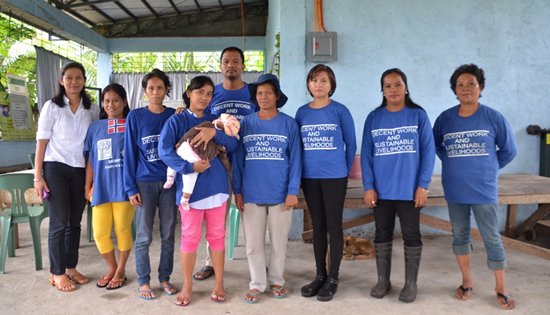
Some
of the members of the Magbinuligon Bayanihan Association-Women
in Development Association (MBA-WIDA) pose with Municipal
Agrarian Reform Program Officer Maritess Nacilla (extreme left).
(Jose Alsmith L. Soria) |
It takes a woman to
do a man’s job: The MBA-WIDA story
By
JOHN CHRISTOPHER COLASITO
March 23, 2017
TACLOBAN CITY –
Former British Prime Minister Margaret Tatcher, once said, “...that
whenever you want things said, give it to a man, and when you want
things done, give it to a woman.” The women of Magbinuligon Bayanihan
Association – Women In Development Association (MBA-WIDA) formerly the
Opong MPC are proof that women can indeed bring change and make things
happen.
Formed from the defunct
Opong MPC, the MBA was organized with the help of DAR in 2009.
According to DAR Agrarian Reform Program Officer I (ARPO I) Ma.
Milagrosa Noveda, she spearheaded the reorganization effort of what is
now the MBA, and has 379 members, 197 of which are females and 182 are
males. It is a federation or network organization, with WIDA as its
affiliate member.
The organization has a one
(1) hectare communal farm planted to high yielding vegetable
varieties, in addition to a less than a hectare tilapia fish pond. It
is also engaged in rice production.
But the women of MBA-WIDA,
have walked the extra mile. They may look comely, shy and pretty; but
mind you, some of them are certified welders with NC II certificates
from TESDA. Some have also received training in carpentry and masonry,
and gentlemen, take a bow, these ladies constructed their warehouse
from scratch. ARPO I Noveda says that these women actually built their
warehouse, and it was a sight to see them holding hammers, welding
tools and do construction work. Welding, carpentry and masonry, are
traditionally the preserve of men. It is not every day that we find
women in a rural community break the gender barriers, and the women of
MBA-WIDA, have shown they can indeed make a difference.
In a rural community, the
traditional occupational roles are very much emphasized between sexes.
However, things were to change when super typhoon Yolanda came. It
brought change at a rapid pace.
Several international
non-government organizations, private agencies and donors, and
government agencies poured assistance to calamity-stricken areas,
Tolosa, included. There was also a serious shortage of skilled labor
particularly for carpenters, masons, plumbers, electricians and the
like. Soon, government agencies and civic-minded organizations started
training those interested in these skilled occupations that were in
short supply. These trainings included both men and women, and the
members of MBA-WIDA. Together, they were a force in the rehabilitation
and development of their community. After Yolanda, it opened several
opportunities for livelihood and entrepreneurship.
But they did not stop there.
They were able to access ILO funding worth P2M, more or less, for the
construction of their building with provisions for an office and
storage area. It was here that the women showed their carpentry,
masonry and welding skills, and did traditional chores that used to be
the preserve of men, a few years back. Yes, there were males who
helped them along the way, but this was something new and it signalled
a new chapter in the life of empowerment of women in local life.
They were also a beneficiary
under the Partnership Against Hunger and Poverty (PAHP), ARPO I Noveda
said. They also availed of the on-site training provided by DAR and
from partners. Today, they are engaged in addition to their vegetable
production where they produce bell peppers, they are in vermi-cast
production, an organic fertilizer derived from African Night Crawlers
earthworms with technology provided by the DAR. They produce green
charcoal briquettes. They have also engaged in the production of red
rice organically, which is in high demand for the wellness and health
conscious market, particularly the diabetics.
They have diversified their interests: meat processing, and catering
business. In line with this, they underwent trainings in food
preparation and food handling, table skirting. They have also produced
nuggets from vegetables. Their latest venture is the production of
organic dishwashing liquid, which they started marketing in their
area.
The MBA-WIDA is an epitome
of empowerment, breaking traditional stereotypes. They have also
learned to think of their future, access and mobilize resources to
effect their plans. They may have to deal with challenges along the
way. But after the storm, they have charted their lives in their
hands, and blazed new trails.
Davao-made Malagos
Premium Chocolates launched in the US
By DTI- Industry Promotion
Group
November 18, 2016
MAKATI
CITY – The Department of Trade and Industry’s Philippine Trade and
Investment Center Los Angeles (PTIC-LA) confirmed that Malagos Premium
Chocolates, a chocolate produced in the Philippines, will now be
available in the United States. This was further to the announcement
made by the Davao-based Malagos Agri-Ventures during their recent
participation at the North West Chocolate Festival in Seattle,
Washington on November 12 -13, 2016.